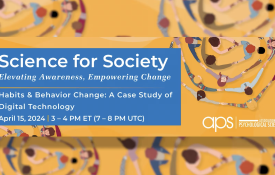-
How Feelings of Disconnection and Lack of Control Fuel Conspiracy Beliefs
Analysis – Conspiracy theories have always been a part of society, offering explanations – sometimes simple, often elaborate – for complex events. Some have uncovered genuine conspiracies, such as the Watergate scandal. Most lack substance but Visit Page
-

Cultural Differences Account for Starkly Different Responses to COVID-19
The cultural differences between the United States and East Asian countries that contributed to divergent COVID-19 outcomes are the focus of the latest issue of Psychological Science in the Public Interest. Visit Page
-

Tackling the Force of Habit
How much of our behavior is habitual? APS President Wendy Wood and her colleagues answered this question on April 16 during “Habits and Behavior Change—A Case Study of Digital Technology,” an APS Science for Society webinar. The webinar is now available for registrants and APS members. Visit Page
-

New Content From Perspectives on Psychological Science
A sample of research on intergroup attitudes, social drivers on digital media, the conversational silencing of racism in psychological science, what makes a group emotional, and much more. Visit Page
-

Multilab Replication Challenges Long-held Theories on Cognitive Dissonance
One of the foremost models that scientists use to measure the effects of cognitive dissonance may have some deficiencies, a new multilab registered replication indicates. Visit Page
-
Can Body Shaming Be Outlawed?
In 1961 at the age of 37, Jean Nidetch, who struggled with her weight for most of her life, signed up for a 10-week program offered by the New York City Board of Health called the Visit Page

